Links to external sources may no longer work as intended. The content may not represent the latest thinking in this area or the Society’s current position on the topic.
Readers, writers and erasers
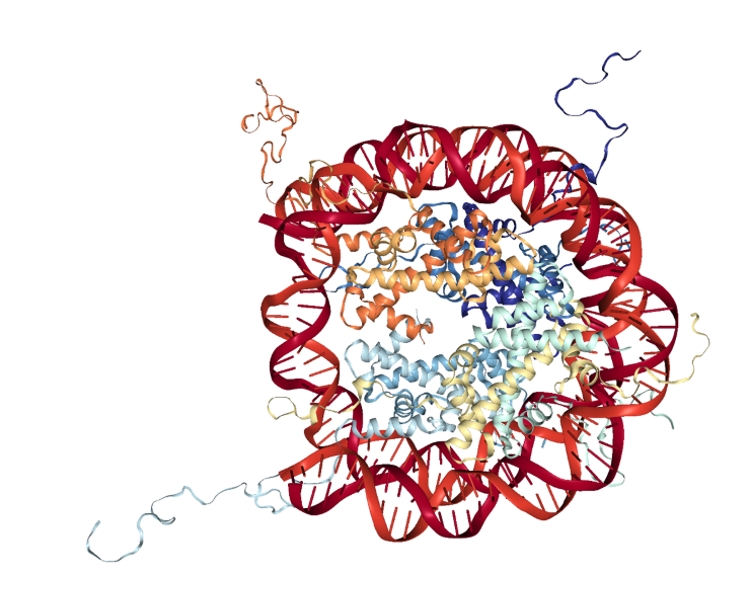
Satellite meeting organised by Professor A Ganesan, Professor Marianne Rots, Dr Paola Arimondo and Dr Akane Kawamura.
Epigenetics refers to the control mechanisms that determine which genes are turned on or off in eukaryotic organisms. Epigenetics is fundamental to normal development and an organism’s response to the environment while its dysregulation is linked to disease conditions. This interdisciplinary meeting brought together chemists and biologists that are internationally leading in cutting edge areas of epigenetics.
Speaker biographies and abstracts are available below. Recorded audio of the presentations are also available below.
Attending this event
This event has taken place.
Prior to this meeting, there was a related discussion meeting 'Frontiers in epigenetic chemical biology' held at the Royal Society London on 22 - 23 May 2017.
Enquiries: Contact the Scientific Programmes team
Organisers
Schedule
Chair
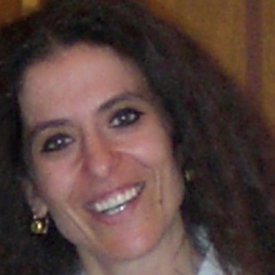
Professor Lucia Altucci, University of Campania Luigi Vanvitelli, Italy

Professor Lucia Altucci, University of Campania Luigi Vanvitelli, Italy
Professor Altucci studied for a degree in Medicine and Surgery, specialising in Medical Oncology, and a PhD in Molecular Pathology before taking up a postdoctoral position at the IGBMC in Strasbourg. Currently she is Professor of General Pathology at the University of Campania Luigi Vanvitelli, where she is also the Rector's delegate for research. Her research interests include translational medicine, mechanisms of tumorigenesis, differentiation and cell death. She is also interested in drug discovery. Professor Altucci has more than 180 peer-reviewed publications.
| 09:05 - 09:30 |
Catalytic plasticity of DNA methyltransferases: can writers be erasers?
Epigenetic states of cytosine, (5-methylcytosine (5mC), 5-hydroxymethylcytosine (hmC), 5-formylcytosine and 5-carboxylcytosine (caC)) are part of an intricate regulation in eukaryote genomes including humans, which contribute to normal phenotypic variation and disease risk. DNA cytosine-5 methyltransferases (C5-MTases), which catalyse the transfer of the methyl group from the ubiquitous cofactor AdoMet to the 5-position of cytosine residues, serve as primary writers of epigenetic DNA marks. Mechanistic studies of both bacterial and mammalian enzymes showed that the reaction requires covalent activation of the cytosine ring by the enzyme before the cofactor-dependent methylation can occur. The group found that, in the absence of AdoMet, the activated cytosine or hmc residues can react with non-cofactor-like compounds such as aldehydes or thiols leading to their further modification; similar enzymatic activation of hmC or caC residues leads to a loss of 5-hydromethyl- or 5-carboxyl groups, respectively, yielding unmodified cytosine in DNA. These novel atypical reactions illustrate a high catalytic plasticity of C5-MTases in vitro and provide plausible chemical precedents in support of possible roles of these enzymes in direct erasure of epigenetic marks in mammalian DNA. 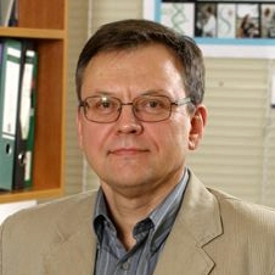
Professor Saulius Klimašauskas, Vilnius University, Lithuania

Professor Saulius Klimašauskas, Vilnius University, LithuaniaProfessor Saulius Klimašauskas is a Chief Scientist and Head of Department at the Institute of Biotechnology, Vilnius University, Lithuania. After graduating from the Department of Chemistry at Vilnius University and receiving his PhD in Bioorganic Chemistry (in 1987) he spent 5 years as a visiting scientist with Sir Richard J. Roberts (NL, FRS) at the Cold Spring Harbor Laboratory, NY. In 1995, he established his own lab back at the Institute of Biotechnology which focused on mechanistic studies and molecular engineering of DNA modification enzymes and development of molecular tools for targeted labelling of biopolymers. He has published over 80 scientific papers and international patents. Professor Klimašauskas was a repeat HHMI International Research Scholar (1995–2005), a JSPS invited professor at Osaka University, Japan, became Fellow of the Royal Society of Chemistry (in 2015) and a recipient of numerous national prizes and awards. |
|
|---|---|---|
| 09:30 - 09:45 | Discussion | |
| 09:45 - 10:15 |
Sympathy for the methyl: a 'library-on-library' screening approach to identify small-molecule ligands of methyl-lysine reader proteins
The discovery of inhibitors of methyl- and acetyl-binding domains has provided evidence for the 'druggability' of epigenetic effector molecules. Using a library of biotin-tagged analogs the group screened a protein domain microarray of methyl-lysine effector molecules to rapidly detect compounds with novel binding profiles – either improved or loosened specificity. Using this approach, the group identified compounds that acquired novel interactions with Tudor domain-and MBT domain-containing proteins. 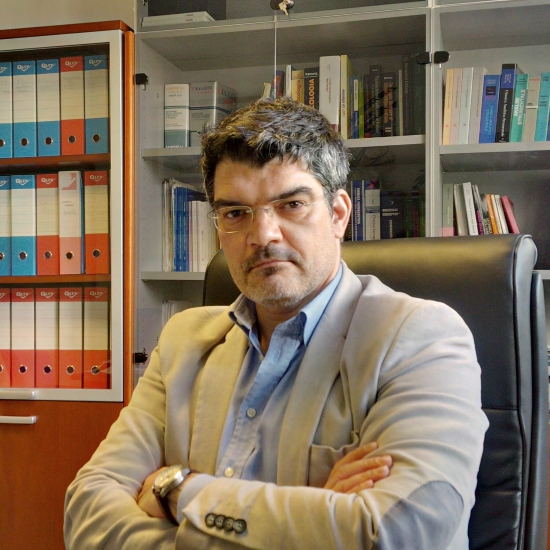
Professor Gianluca Sbardella, University of Salerno, Italy

Professor Gianluca Sbardella, University of Salerno, ItalyProfessor Sbardella studied Medicinal Chemistry at the University of Rome “La Sapienza”, Italy, and received his PhD from the same University. After postdoctoral researches at the Drug Chemistry Center of the Italian National Research Council (CNR, 1997), at the Italian National Institute of Health (ISS, 1998 – 1999), at the Italian Pasteur Institute (2000) and at the University of Rome “La Sapienza” (2000), he was Research Associate at the University of Siena, Italy. In 2001 he joined the Department of Pharmacy of the University of Salerno as Assistant Professor in Medicinal Chemistry. In 2002 he became Associate Professor and in 2004 spent a sabbatical period as visiting professor at the Department of Chemistry and Biochemistry of the University of California, Los Angeles (UCLA). He is now Full Professor of Medicinal Chemistry and Director of the PhD program in Drug Discovery and Development. His research regards most aspects of epigenetic drug discovery, spanning synthetic strategies, medicinal chemistry, chemical biology, biophysical techniques. He is the Head of the Epigenetic Med Chem Lab (EMCL), a multi-disciplinary research team whose mission is the study of protein targets responsible (directly or indirectly) of epigenetic modifications and of proteins regulated by epigenetic processes. He is also Secretary of the Medicinal Chemistry Division of the Italian Chemical Society. |
|
| 10:15 - 10:30 | Discussion | |
| 10:30 - 11:00 | Coffee | |
| 11:00 - 11:30 |
Development of cyclic peptide inhibitors against KDM4 JmjC histone demethylases
Post-translational modifications on histone tails are important in epigenetic regulation of gene expression. N-methylation on lysine residues is removed by histone demethylases (KDMs). JmjC-domain containing KDMs are Fe(II) and 2-oxoglutarate dependent oxygenases, which make up the larger of the two KDM families. This talk will give an overview of our recent inhibitor development efforts for this family of enzymes, including new strategies used to develop histone substrate competitive cyclic peptide inhibitors for the KDM4A-C. 
Dr Akane Kawamura, University of Oxford, UK

Dr Akane Kawamura, University of Oxford, UKAkane Kawamura, DPhil, is a Dorothy Hodgkin Research Fellow and a University Research Lecturer, based in the Departments of Chemistry and Radcliffe Department of Medicine at the University of Oxford. After her undergraduate degree in Chemistry, she received her DPhil in Pharmacology, working with Professor Edith Sim on the biochemical and biophysical investigations on Phase II drug metabolising enzymes. She spent three years in industry as a senior researcher, where she led a number of drug discovery projects across a wide range of therapeutic areas. In 2009 she returned to academia to work with Professor Chris Schofield FRS at the University of Oxford on chemical biology of epigenetic regulation. She was awarded a BHF CRE Fellowship in 2012 and a Dorothy Hodgkin Fellowship in 2013. Her group’s research focuses on the biochemical / cellular studies of histone demethylases, the development of chemical probes against epigenetic protein targets, and the development of novel peptide-based target validation approaches. |
|
| 11:30 - 11:45 | Discussion | |
| 11:45 - 12:15 |
Chemical epigenetics - inhibitors of methyl lysine readers and sirtuin deacylases
Professor Jung's research focus is `Chemical Epigenetics´ and deals with the development and application of chemical and biochemical tools to dissect biological pathways, to validate therapeutic targets and to discover and optimise potential drugs addressing a wide range of epigenetic targets. In this talk two targets are presented: NAD-dependent protein deacetylases (sirtuins) and the methyl lysine reader protein Spindlin1 (Spin1). The group has developed a wide range of biochemical and biophysical assays for these targets which have identified new hits. These were subsequently optimised in a structure-guided fashion for potency and selectivity and were converted into functionalised tools for chemical biology. For example, the group has developed a biotinylated Sirt2 inhibitor for chemoproteomic studies and a proteolysis targeted chimera (PROTAC) based on thalidomide and Sirt2 inhibitors from the SirReal class. 
Professor Manfred Jung, University of Freiburg, Germany

Professor Manfred Jung, University of Freiburg, GermanyManfred Jung did his PhD at the University of Marburg in 1993, then he worked as a postdoc with T. Durst at the University of Ottawa. From 1994 to 2003 he was a group leader at the University of Münster and obtained his habilitation in Pharmaceutical Chemistry in 2000. Since 2003 he was a Professor of Pharmaceutical Chemistry at the University of Freiburg and since 2011 he is Full Professor there. In 2011/12 and for 2016/17 he was appointed as Senior Fellow at the Freiburg Institute of Advanced Studies (FRIAS). Professor Jung is currently the dean of the Faculty of Chemistry and Pharmacy. The topic of his research is Chemical Epigenetics with a major focus on histone modifying enzymes. His group is working on inhibitor synthesis, assay development and screening for inhibitors of reversible histone acetylation and methylation, as well as methyl-lysine reader proteins. |
|
| 12:15 - 12:30 | Discussion |
Chair

Dr Akane Kawamura, University of Oxford, UK

Dr Akane Kawamura, University of Oxford, UK
Akane Kawamura, DPhil, is a Dorothy Hodgkin Research Fellow and a University Research Lecturer, based in the Departments of Chemistry and Radcliffe Department of Medicine at the University of Oxford. After her undergraduate degree in Chemistry, she received her DPhil in Pharmacology, working with Professor Edith Sim on the biochemical and biophysical investigations on Phase II drug metabolising enzymes. She spent three years in industry as a senior researcher, where she led a number of drug discovery projects across a wide range of therapeutic areas. In 2009 she returned to academia to work with Professor Chris Schofield FRS at the University of Oxford on chemical biology of epigenetic regulation. She was awarded a BHF CRE Fellowship in 2012 and a Dorothy Hodgkin Fellowship in 2013. Her group’s research focuses on the biochemical / cellular studies of histone demethylases, the development of chemical probes against epigenetic protein targets, and the development of novel peptide-based target validation approaches.
| 13:30 - 14:00 |
Targeting the lysine specific demethylase LSD1
For a long time, the methylation of lysine residues in proteins was considered an irreversible process. Over the last decade, this viewpoint has dramatically changed with the discovery of lysine demethylase enzymes (KDMs). The KDMs are evolutionarily conserved between eukaryotic species and subdivided into lysine-specific demethylases (LSD1 and LSD2) and the Jumonji C demethylases (over 20 human isoforms). LSD1, the first identified demethylase in 2004, performs an essential function in normal growth and development. Nevertheless, human disease states are strongly linked to aberrant LSD1 activity. Through demethylation of H3K4 residues, LSD1 maintains stemness in leukaemia and silencing of differentiation while H3K9 demethylation promoted by the androgen or oestrogen receptor drives proliferation. Interest in LSD1 inhibition as a therapeutic strategy has matured over the last decade and led to multiple clinical candidates currently undergoing trials for cancer. The presentation will provide an overview of LSD1 function and medicinal chemistry and give examples of reversible and irreversible inhibitors from our research. 
Professor A. Ganesan, University of East Anglia, UK

Professor A. Ganesan, University of East Anglia, UKGanesan graduated with a BSc (Hons) in Chemistry from the National University of Singapore and a PhD from the University of California-Berkeley supervised by Clayton H. Heathcock. After postdoctoral research with Gregory Verdine at Harvard University, he was a Senior Research Chemist at the Centre for Natural Product Research, Singapore (1993-96) and Principal Investigator at the Institute of Molecular and Cell Biology, Singapore (1996-99). In 1999 he joined the University of Southampton as a Reader in the Combinatorial Chemistry Centre for Excellence. In 2011 he became the Chair of Chemical Biology at the University of East Anglia’s School of Pharmacy. His research is focused on chemical biology, medicinal chemistry and organic synthesis. Ganesan is co-founder of the drug discovery company Karus Therapeutics, Chair of the EU COST Action CM1406 Epigenetic Chemical Biology and a member of the IUPAC Subcommittee for Medicinal Chemistry and Drug Development. |
|
|---|---|---|
| 14:00 - 14:15 | Discussion | |
| 14:15 - 14:45 |
Targeting transcriptional programmes through disruption of BET complexes
Transcriptional programs are often deregulated in disease, offering opportunities for therapeutic intervention. One of the most promising over recent years is through targeting epigenetic readers of the bromo and extra-terminal (BET) family. Despite the successful translation of BET-inhibitors into the clinic, emergence of toxicity and resistance necessitate better understanding of the underpinning biology, in order to develop safer therapeutics. To address this the group studied the contribution(s) of the modular domain organisation of BET proteins offering a recruitment platform for transcriptional complexes. Employing proteomics the group finds BETs linked to large complexes associated both with transcriptional activation as well as suppression of key survival programmes. The group furthermore identifies shared and distinct structural determinants leading to complex assembly and demonstrate in vitro and in cells that it is possible to target specific BET-complex component interactions leading to complex perturbation. These data point towards an under-appreciated role of modularity within BETs in linking transcriptional attenuators to chromatin, revealing protein-specific contributions into complex assembly and informing into potential combination therapies providing novel points for intervention in a clinical setting. 
Professor Panagis Filippakopoulos, University of Oxford, UK

Professor Panagis Filippakopoulos, University of Oxford, UKPanagis obtained his BSc in Chemistry from the Aristotelian University of Thessaloniki in Greece and his PhD in Inorganic Chemistry at the University of Michigan. He then moved to Oxford at the Structural Genomics Consortium (SGC) where he focused on protein crystallography and biophysics. He is currently a Wellcome Trust Career Development fellow, a Principal Investigator at the SGC, an affiliate of the Ludwig Institute for Cancer Research (LICR), an Associate Professor in Structural Biology at the Nuffield department of Clinical Medicine at Oxford and a visiting Professor at the University of Tsukuba in Japan. His research interests focus on structural comparisons of entire protein families and the discovery of shared and distinct mechanisms that determine substrate recognition and protein regulation, as well as the structure-guided design of specific inhibitors that modulate the function of proteins involved in epigenetic signalling, aiming to target them in cancer. |
|
| 14:45 - 15:00 | Discussion | |
| 15:00 - 15:30 | Tea | |
| 15:30 - 16:00 |
Transition state mimics as PRMT inhibitors and tools for structural studies
The protein arginine N-methyltransferases (PRMTs) are a family of enzymes that function by specifically transferring a methyl group from the cofactor S-adenosyl-L-methionine (AdoMet) to the guanidine moiety of arginine side chains in target proteins. Most notable is the PRMT-mediated methylation of arginine residues found in histone proteins which can lead to chromatin remodelling and influence gene transcription. A growing body of evidence now implicates dysregulated PRMT activity in a number of diseases including various forms of cancer. The development of PRMT inhibitors hold potential as a means of developing new therapeutics. The group here reports the synthesis and evaluation of a series of small molecule PRMT inhibitors designed to simultaneously occupy the binding sites of both the guanidino substrate and AdoMet cofactor. Potent inhibition and surprising selectivity was observed when testing these compounds against a panel of methyltransferases. An atomic-scale understanding of the PRMT catalytic mechanism is also crucial for both fundamental biological and pharmacological applications. Despite intense efforts, crystal structures of PRMT complexes with long peptides and full-length substrates have not been solved due to their inherent instability. To address this issue the group has recently developed peptide-based transition state mimics that form stable complexes with the PRMT enzyme CARM1 resulting in high-resolution co-crystal structures. These findings provide an exciting new approach to understanding PRMT substrate recognition and the regulation of arginine methylation. 
Professor Nathaniel I. Martin, Utrecht University, The Netherlands

Professor Nathaniel I. Martin, Utrecht University, The NetherlandsNathaniel Martin obtained his PhD degree in 2004 from the University of Alberta (Canada) after which he carried out postdoctoral studies at the University of California, Berkeley. In 2007 he began his independent research career at Utrecht University where he currently supervises a team of researchers whose interests involve the design, synthesis, and study of biologically active peptides and small molecules. Investigations in the Martin group are typically rooted in synthetic chemistry and are broadly applied towards developing new (bio)chemical strategies for addressing a number of biomedical challenges. Work in the group ranges from developing new antibiotics for combatting drug-resistant bacteria to developing new inhibitors and molecular tools with which to study epigenetic processes implicated in cancer and other diseases. |
|
| 16:00 - 16:15 | Discussion | |
| 16:15 - 17:15 | Selected short presentations |
Chair
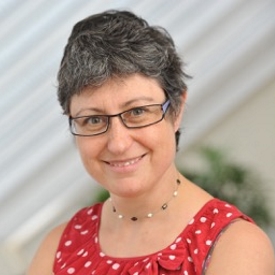
Dr Paola B. Arimondo, CNRS, Institut Pasteur, EpiCBio, France

Dr Paola B. Arimondo, CNRS, Institut Pasteur, EpiCBio, France
Dr Paola B. Arimondo studied Chemistry at the University of Pisa, Italy, and received a PhD in Biophysics at the MNHN in Paris. In 2001, she was recruited by the CNRS. Her research focused on the interactions between nucleic acids and proteins and their modulation by small chemical molecules, resulting in site-specific ‘DNA scissors’ in cancer cells. After a six-month sabbatical in 2005 at the University of California in Berkeley, she initiated a new project aiming at the epigenetic control of gene expression in cancers. In 2011, she was recruited to lead the Laboratory of Epigenetic Targeting of Cancer, a joint public-private Laboratory between the CNRS and Pierre Fabre Laboratories, in Toulouse, France. She now develops chemical modulators of DNA and histone methylation to study the aberrant epigenetic mechanisms in cancer and identify new targets or biomarkers. Dr Arimondo is co-author of 92 publications and of 9 patents, was awarded the ‘Médaille de Bronze’ of CNRS, ‘Prix de l’Encouragement’ of the French Société de Chimie Thérapeutique, and the ‘Marie Curie Excellence Award’ of the European Community. She is actually Oversea Fellow at the Churchill College in Cambridge UK.
| 09:00 - 09:30 |
Epigenetic dysfunctions in cancer: a cause or a consequence?
The epigenetic landscape is deregulated in cancer due to aberrant activation/ inactivation of enzymes maintaining and modifying the epigenome. Aberrations at the global histone level and/or specific histone modifications may produce distorted patterns of gene expression and malfunction of proteins that regulate chromatin structure. Recent whole genome studies demonstrated that histones and chaperone proteins harbour mutations that may result in gross alterations of the epigenome leading to genome instability. IDH1/2 (isocitrate dehydrogenase 1/2) mutations have been detected in hematologic malignancies and certain solid tumours. Point mutations in IDH1/2 confer a gain-of-function in cancer cells, resulting in accumulation of the D-2-hydroxyglutarate (D-2HG). High levels of D-2HG interfere with cellular metabolism and epigenetic regulation by inhibiting histone and DNA demethylases, which results in blocking cellular differentiation. Histone deacetylases (HDACs) are critical regulators of gene expression that promote chromatin changes by deacetylating histones. Aberrant regulation of HDACs contributes to malignant transformation and progression in many human cancers. Dysfunction of the histone lysine methyltransferase EZH2 occurs in numerous cancers. EZH2 a part of the polycomb repressive complex 2 which catalyses trimethylation of histone H3 lysine 27. It supports undifferentiated phenotype and blocks differentiation during embryonic development and carcinogenesis. Epigenetic-based mechanisms are reversible and 'resetting' the abnormal cancer epigenome by pharmacological compounds targeting epigenetic enzymes is a promising strategy. Several novel drugs targeting tumours with mutated IDH1/2/ and numerous HDAC inhibitors have been identified. These compounds cause cell cycle arrest or death, inhibit DNA repair and some entered clinical trials for cancer treatment. 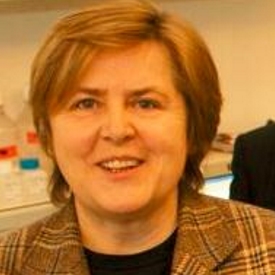
Professor Bozena Kaminska, Nencki Institute of Experimental Biology, Poland

Professor Bozena Kaminska, Nencki Institute of Experimental Biology, PolandDr Bozena Kaminska is Professor at the Nencki Institute of Experimental Biology Warsaw and Director of the Postgraduate School of Molecular Medicine, Warsaw Medical University. She is a corresponding member of the Polish Academy of Sciences (2016). She did her PhD in biochemistry (1991) at the Nencki Institute (Warsaw, Poland) and postdoctoral training at the Department of Psychology, McGill University, Montreal, Canada (1994-1996). In 2001-2002 she was a visiting scientist at the Brain Research Institute, UCLA, USA. Kaminska's research group is focused on epigenetic modifications on chromatin, RNA and DNA and their involvement in cancer. She has discovered the role of innate immune cells in glioma progression, and studied epigenetic dysfunctions and chromatin modification pathways in brain tumours. She promoted 24 PhD students and is currently involved in 12 basic research and translational projects aiming at development of novel antitumour therapeutics. She is a co-founder of cancer drug discovery company GLIA and an elected member of Academia.net. |
|
|---|---|---|
| 09:30 - 09:45 | Discussion | |
| 09:45 - 10:15 |
Epigenetic biomarkers
An increasing body of evidence is implicating several epigenetic mechanisms as driving forces of neoplastic transformation. Among these, aberrant DNA methylation is, by far, the most widely studied, followed by deregulated expression of chromatin machinery proteins and non-coding RNAs, including microRNAs. Importantly, cancer-related epigenetic alterations may provide novel cancer biomarkers, intended for early detection and diagnosis, assessment of prognosis, and prediction of response to therapy. The importance of early diagnosis in Oncology has been emphasised and although current methodologies (such as cytology, histopathology, immunohistochemistry, etc) play a critical role, molecular markers may complement or, eventually, replace them if more effective. Because epigenetic alterations often precede the emergence of the malignant phenotype, they are advantageous for early cancer detection. They might also be detected in clinical samples, including those obtained by biopsy, as well from those obtained by non-invasive methods, such as urine. Moreover, early detection of cancer relapse before it manifests clinically (or on imaging during routine patient follow-up) might be accomplished through epigenetic-based biomarkers. Some epigenetic alterations have also been associated with tumour behaviour and may, thus, serve as prognostic biomarkers. In this talk, Professor Jerónimo will focus on the major recent findings obtained by her research team regarding epigenetic mechanisms implicated in urological tumorigenesis as well as the potential usefulness of epigenetic-based biomarkers for detection and prognostication in these cancers. 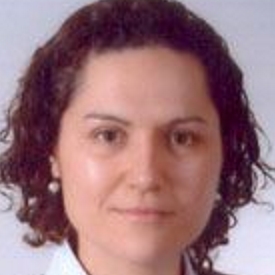
Professor Carmen Jerónimo, Portuguese Oncology Institute and University of Porto, Portugal

Professor Carmen Jerónimo, Portuguese Oncology Institute and University of Porto, PortugalProfessor Carmen Jerónimo is Invited Associate Professor in Pathology and Molecular Genetics and the Director of the Master Course in Oncology at the University of Porto, as well as Head of the Cancer Epigenetics Group at the Portuguese Oncology Institute of Porto (IPO Porto), Portugal. She obtained her BSc in Biology (1994), MSc in Oncology (1998), PhD in Biomedical Sciences (2001) and Habilitation in Pathology and Molecular Genetics (2011) at the University of Porto. She developed her PhD project at Johns Hopkins University School of Medicine (JHU), Baltimore, MD, USA, working on prostate cancer’s genetic and epigenetic alterations. From 2002 until 2007, she was a Post-doctoral Fellow and Invited researcher at IPO Porto, in collaboration with JHU, working on detection of neoplastic cells by DNA-based technology in clinical samples obtained from non-invasive or minimal invasive methods. In 2008 she established her independent group at IPO Porto, working on Cancer Biology and Epigenetics (FCT-2008 Science Program). Professor Jerónimo is Associate Editor of Clinical Epigenetics and BMC Cancer and acts as ad hoc reviewer of several scientific journals. To the present date, she has authored or co-authored more than 100 international scientific publications published in prestigious journals, such as JNCI, JCO, Eur J Urol, Clin Can Res, Oncogene, Oncotarget, EJC, BJC and Epigenetics, and four book chapters. As scientific leader, she collaborated in a patent submission (Methods and biomarkers for detection of bladder cancer US 20130210011/ EP 2630261 A1/ WO 2012052844 A1), based in a study from her group in partnership with the Norwegian Radium Hospital and has participated in international projects funded by EU, within the Seventh Framework Programme (EpiDiaCan). She was MC substitute member of Action TD0905 (CMST) - Epigenetics: Bench to Bedside and presently she is MC member and Chair of Working group WG2 of COST Action CM1406 (CMST)- Epigenetic Chemical Biology (EPICHEM). |
|
| 10:15 - 10:30 | Discussion | |
| 10:30 - 11:10 | Coffee | |
| 11:10 - 11:40 |
Epigenome approaches for identification of treatment resistance in cancer
Aberrant activity of epigenetic enzymes plays a role in tumorigenesis. Reversal of these aberrant modifications has emerged as a strategy for cancer treatment. By applying epigenome-based patient stratification, the group identified a set of chromatin areas predictive for standard treatment resistance in leukaemias. Professor Altucci reports that a novel dual-epidrug, as effective in standard treatment resistant cancers. The group identified both the mechanistic insights of this action and biomarkers that might turn into a differential diagnostic tool for leukaemia patients. Together, the group provides proof of concept for the use of epigenome profiling coupled to epi-drugs to ‘personalise’ precision medicine. 
Professor Lucia Altucci, University of Campania Luigi Vanvitelli, Italy

Professor Lucia Altucci, University of Campania Luigi Vanvitelli, ItalyProfessor Altucci studied for a degree in Medicine and Surgery, specialising in Medical Oncology, and a PhD in Molecular Pathology before taking up a postdoctoral position at the IGBMC in Strasbourg. Currently she is Professor of General Pathology at the University of Campania Luigi Vanvitelli, where she is also the Rector's delegate for research. Her research interests include translational medicine, mechanisms of tumorigenesis, differentiation and cell death. She is also interested in drug discovery. Professor Altucci has more than 180 peer-reviewed publications. |
|
| 11:40 - 11:55 | Discussion | |
| 11:55 - 12:25 |
Environmental metals, epigenetics and cardiovascular risk: a population-based perspective
Cardiovascular disease is a major cause of mortality and morbidity world-wide. Current algorithms for cardiovascular risk prediction, which combine behavioural, clinical, and biochemical markers, are, however, of limited accuracy. Understanding novel factors and mechanisms for cardiovascular disease development can contribute to the identification of at-risk individuals, who could benefit the most from preventive interventions. Non-essential environmental metals are emerging as major contributing factors to cardiovascular health in study populations exposed to low or moderate metal dose through air, food or water. Moreover, metals accumulate in the body where they can induce long-term damages. Dr Tellez-Plaza will be discussing available evidence in support of metals as environmental determinants of both epigenetic markers and cardiovascular disease in general populations. The identification of epigenomic regions that are environmentally regulated and may be involved in pathways related to cardiometabolic risk can enable the implementation of both population-based and personalised strategies for the control of cardiovascular disease in the population. Moreover, several lines of evidence suggest that environmental exposures can influence health outcomes in subsequent generations, due to epigenetic changes. It is of interest, thus, to explore novel epigenetic approaches for prevention and treatment of disease, which may be relevant for future generations. 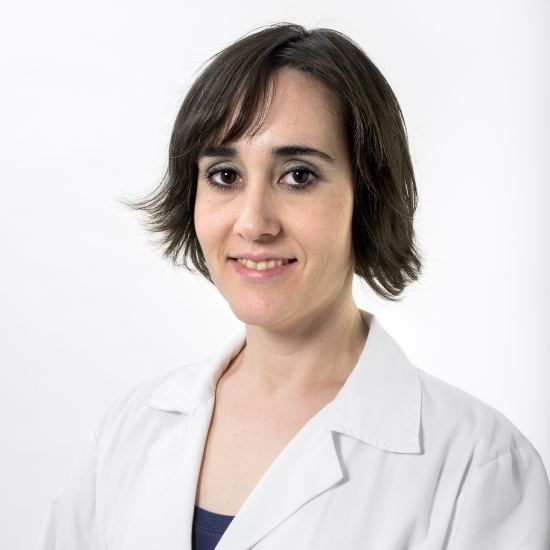
Dr Maria Tellez-Plaza, Hospital Clinic of Valencia University, Spain; Johns Hopkins Bloomberg School of Public Health, USA

Dr Maria Tellez-Plaza, Hospital Clinic of Valencia University, Spain; Johns Hopkins Bloomberg School of Public Health, USADr Maria Tellez–Plaza, is a physician specialist in Preventive Medicine and Public Health with a PhD in Epidemiology from Johns Hopkins University who joined the Institute for Biomedical Research Hospital Clinic de Valencia, Spain, as Tenure-track Investigator. In addition, she holds an Adjunct Professor position in the Autonomous University of Madrid, where she coordinates a course in the MPH program, and an Adjunct Assistant Professor position at the Johns Hopkins University, where she maintains active collaborations with scientists from the Departments of Epidemiology and Environmental Health Sciences. Maria has built a solid publication record in the area of environmental epidemiology, providing novel evidence for metals as a cardiovascular risk factors. Ongoing population-based studies which evaluate the potential role of epigenetics as a mediator of metal-related cardiovascular risk represent a clear next step to her investigations on metal toxicity at exposure levels that are relevant for the general population. |
|
| 12:25 - 12:40 | Discussion |
Chair

Professor A. Ganesan, University of East Anglia, UK

Professor A. Ganesan, University of East Anglia, UK
Ganesan graduated with a BSc (Hons) in Chemistry from the National University of Singapore and a PhD from the University of California-Berkeley supervised by Clayton H. Heathcock. After postdoctoral research with Gregory Verdine at Harvard University, he was a Senior Research Chemist at the Centre for Natural Product Research, Singapore (1993-96) and Principal Investigator at the Institute of Molecular and Cell Biology, Singapore (1996-99). In 1999 he joined the University of Southampton as a Reader in the Combinatorial Chemistry Centre for Excellence. In 2011 he became the Chair of Chemical Biology at the University of East Anglia’s School of Pharmacy. His research is focused on chemical biology, medicinal chemistry and organic synthesis. Ganesan is co-founder of the drug discovery company Karus Therapeutics, Chair of the EU COST Action CM1406 Epigenetic Chemical Biology and a member of the IUPAC Subcommittee for Medicinal Chemistry and Drug Development.
| 13:40 - 14:10 |
Induction of new fungal natural products by epigenetic modifiers: a systematic approach
Fungal endophytes are known to produce a wide variety of secondary metabolites (SMs) involved in their adaptation and survival within higher plants. Plant-microbe interaction may influence the expression of some biosynthetic pathways, otherwise cryptic in these fungi when grown in laboratory conditions. Epigenetic small-molecule modifiers of Histone Deacetylase (HDAC) and DNA methyltransferase (DNMT) activities have been successfully used to perturb the fungal secondary biosynthetic mechanisms, which has led to the induction of the expression of silent metabolite pathways. Adding epigenetic elicitors in fungal endophyte fermentations may induce the expression of biosynthetic pathways which may occur naturally in plant-microbe interaction. The effects of 7 epigenetic modifiers will be described for a case study group of 13 fungal endophytes fermented during 7 and 14 days to evaluate the possible activation of silent biosynthetic pathways compared to their growth in standard conditions. The increase in production titers of global SMs profiles in some of the strains was slightly higher when the elicitors were present from that inoculum stage. Strains that produced differential SMs in presence of the small elicitors were studied in detail and their principal induced components identified and quantified by metabolomics. The described use of epigenetic modifiers in a systematic approach ensured a successful generation of new SMs on regular basis. Current scale-up, purification and chemical characterisation of other selected strains/conditions will be described for the most promising new metabolites induced. 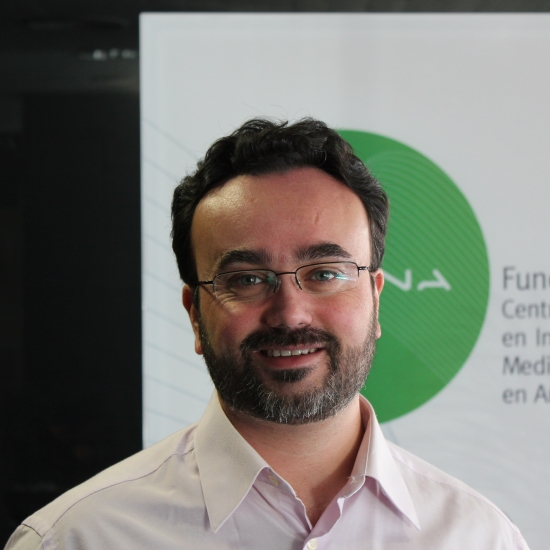
Dr Jose-Rubén Tormo, Fundacion MEDINA, Spain

Dr Jose-Rubén Tormo, Fundacion MEDINA, SpainWith more than 20 years of Research & Development experience, including the management of multidisciplinary teams in international (Merck & Co) and Spanish local pharmaceutical and biotechnology companies. Dr Tormo has international experience in the design, development and supervision of automated chemical extraction techniques for microbial fermentations, compound management of synthetic compounds and natural products, isolation and structural elucidation of natural products and in vitro and in vivo screenings. Dr Tormo has, or is currently supervising, 5 MS Thesis and 4 PhD Thesis, and participated as professor of Chemical Biotechnology in the Internationally awarded ALITER School of Master Degrees for 7 promotions as Coordinator of Natural Products Chemistry in the Master for BioEnterprises of the University of Granada for 5 promotions. |
|
|---|---|---|
| 14:10 - 14:25 | Discussion | |
| 14:25 - 14:55 |
Dietary microbial metabolites as epigenetic modulators in health and disease
Dietary agents from various sources target mechanisms involved in epigenetic gene regulation, including DNA methylation, histone modifications and noncoding RNAs. Recent research has indicated that gut microbial metabolites might be important mediators of these diet-epigenome interaction (Hullar MA, Fu BC. Cancer J 2014). Folate and B vitamins required to generate SAM for methylation reactions are provided by the gut microbiota. Phenolic acids generated by microbial degradation of dietary polyphenols inhibit DNMTs and HDAC activities. Berries and nuts are rich in ellagitannins, which are hydrolysed to ellagic acid and further microbially metabolised to urolithins. Whereas ellagitannin regulated the expression of small non-coding microRNAs, urolithins inhibit the activities or expression of HDACs and HATs in cultured cells. Glucosinolates from cooked cruciferous vegetables require gut bacterial thioglycosidases for cleavage to reactive isothiocyanates (ITCs). The diversity of the gut microbiome therefore affects the bioavailability of ITCs, which can be further metabolized to HDAC inhibitors. Fermentation of dietary fibre leads to formation of short chain fatty acids including butyrate. Butyrate has a dose-dependent dual effect on HATs and HDACs and both promotes proliferation and induces cell cycle arrest and differentiation Donohoe et al. Mol Cell 2012). Long-chain omega-3-fatty acids (LC ω-3-FA) regulate histone methylation and miRNA expression in vitro and in vivo. The availability and efficacy of LC ω-3 FA might be affected by gut microbial metabolism to conjugated linolenic acids (CLA), which were shown to modify methylation patterns of genes and expression of miRNAs involved in energy balance and lipid metabolism. In summary, these examples indicate that the gut microbiota interacts with the epigenome in various ways. Future studies need to integrate information on dietary intake, microbiome and metabolome, with genome-wide epigenetic profiling results to draw conclusions on how to influence this complex system in the direction of improved human health. 
Dr Clarissa Gerhäuser, German Cancer Center, Germany

Dr Clarissa Gerhäuser, German Cancer Center, GermanyDr Clarissa Gerhäuser studied Pharmacy at the University of Würzburg and obtained a PhD (summa cum laude) in Pharmaceutical Biology at the University of Munich in 1993. She worked as a postdoc and research assistant professor in the area of cancer chemoprevention at The University of Illinois at Chicago from 1993 to 1996. In 1996, she joined the German Cancer Research Center (DKFZ) in Heidelberg and currently heads the group Cancer Chemoprevention and Epigenomics. Her major research interest is the investigation of molecular mechanisms associated with breast and prostate cancer, with a strong focus on epigenetic mechanisms. She has authored more than 100 research articles, reviews and book chapters and holds four patents. Also, she has co-edited a comprehensive reference book on Chemoprevention of Cancer and DNA damage by dietary factors (Wiley Press, 2009). |
|
| 14:55 - 15:10 | Discussion | |
| 15:10 - 15:50 | Tea | |
| 15:50 - 16:30 | Selected short presentations | |
| 16:30 - 17:00 | Concluding remarks |

